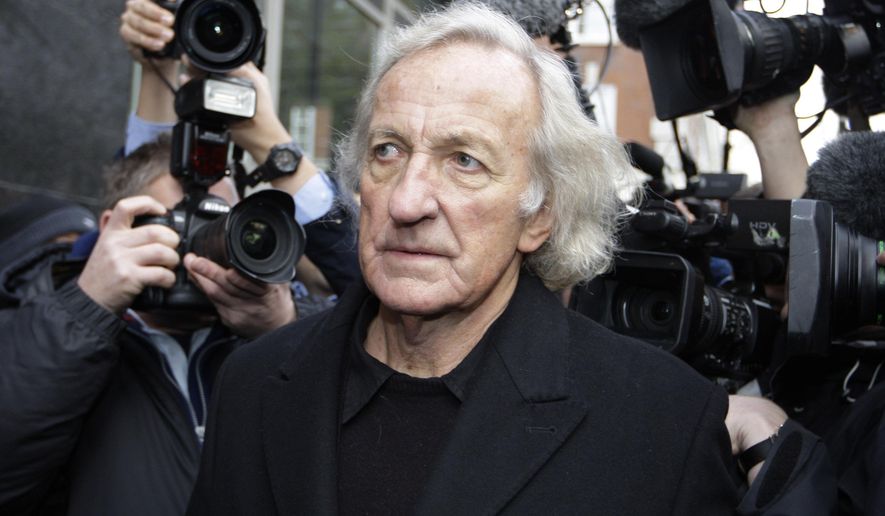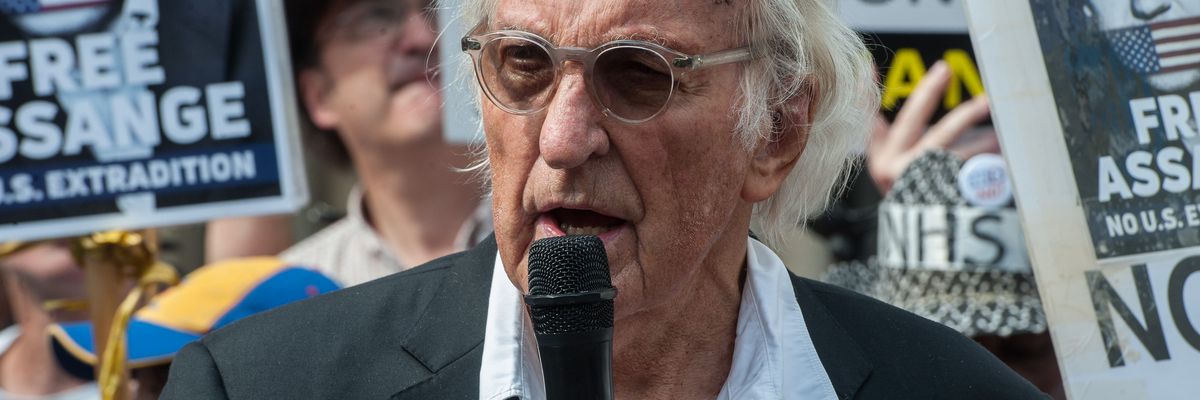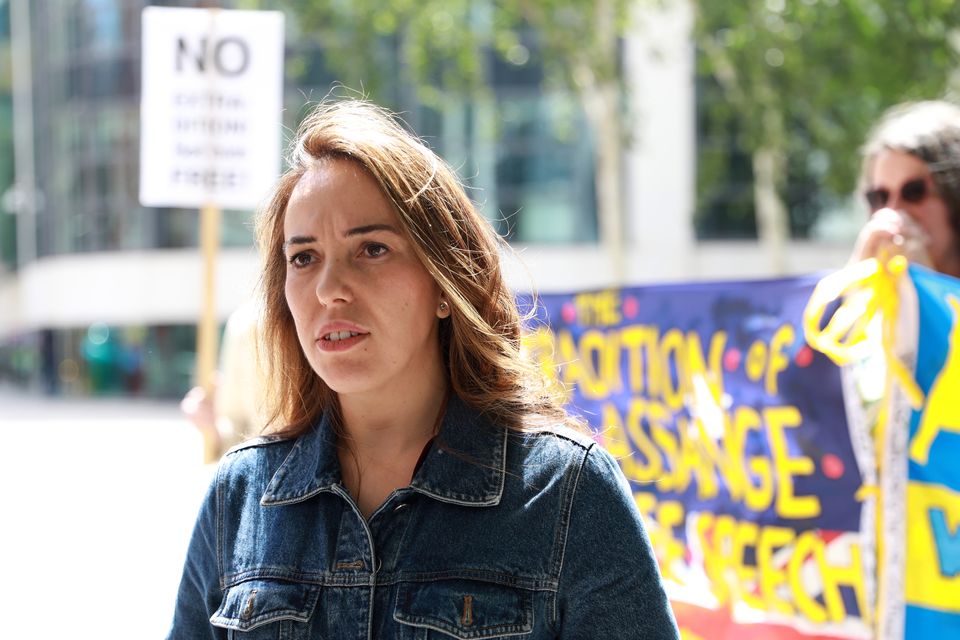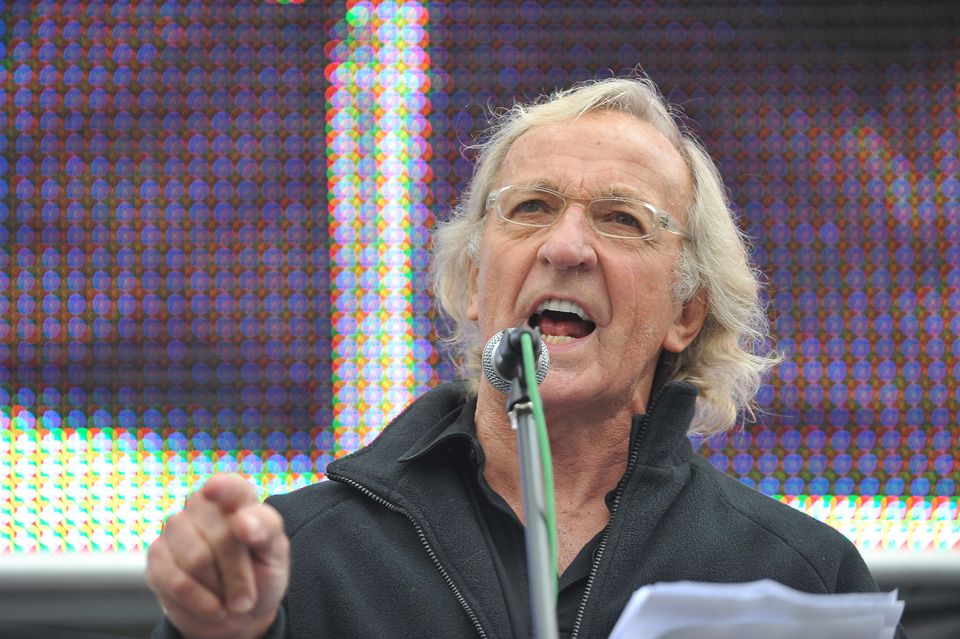RIP John Pilger
 A bright star in the firmament of justice has gone out. One of the greatest journalists of our era has passed away.
A bright star in the firmament of justice has gone out. One of the greatest journalists of our era has passed away.
John Pilger was always on the side of the oppressed. He denounced Imperialism and all its violent predations–war, genocide, exploitation–as well as its endless lies and propaganda. Till his death, he fought tirelessly for the freedom of Julian Assange, and his last article was a call to solidarity.
John gave voice to the invisible and the voiceless: the hungry, the poor, the handicapped, the conscripted, the sanctioned & bombed, the dispossessed, refugees, the chemically experimented on, the structurally adjusted, the coup’ed, the famine-expendable, the colonized, the genocided, the silenced, shining a light in the hidden, dark recesses of the hell of Empire and Capital.
He denounced and fought racism, war, privatization, neocolonialism, neoliberalism, globalization, propaganda, advertising, nuclear madness, US coups,
His filmography and writing is a rap sheet of the unceasing criminality of Empire.
Arguably giving him the best homage it could render, the British Television Authority described him as “A threat to Western Civilization.”
John was also prophetic: in 1970, he chronicled the insurrection of troops against the Vietnam war in The Quiet Mutiny. In 1974, and again in 2002, he spoke out that “Palestine was still the Issue,” demanding that “the occupation of Palestine should end now”. He warned about Japanese militarism and revisionism. In 2014, he warned that Ukraine, a “CIA theme park”, was preparing “a Nato-run guerrilla war that is likely to spill into Russia itself”. Seven years ago, when only a few were aware, and even fewer were speaking out–in short words and articles–he released a full-length, full-throated documentary warning the world that the US was escalating catastrophically to War with China.
John was not only a powerful critical journalist and world-changing filmmaker–Cambodia Year Zero is considered one of the most influential documentaries of the 20th century. He was also a craftsman, a poet, artist–he understood the power of language but also understood that in a medium restricted by word counts, what it meant to make every word count.
But it was John’s rich, resonant delivery–like a Shakespearean actor–that always struck me. It contained the unmistakable, unimpeachable courage of moral integrity: a voice that knows it is speaking the truth.
You will hear many things about him in the days to come–as we speak, the MSM are retrieving their pre-written, canned obituaries from the deep freeze–but John’s own words are most insightful.
On the form of journalism:
In all these forms the aim should be to find out as many facts and as much of the truth as possible. There’s no mystery. Yes, we all bring a personal perspective to work; that’s our human right. Mine is to be skeptical of those who seek to control us, indeed of all authority that isn’t accountable, and not to accept “official truths”, which are often lies. Journalism is or ought to be the agent of people, not power: the view from the ground.
On making a difference:
… the aim of good journalism is or ought to be to give people the power of information – without which they cannot claim certain freedoms. It’s as straightforward as that. Now and then you do see the effects of a particular documentary or series of reports. In Cambodia, more than $50 million were given by the public, entirely unsolicited, following my first film; and my colleagues and I were able to use this to buy medical supplies, food and clothing. Several governments changed their policies as a result. Something similar happened following the showing of my documentary on East Timor – filmed, most of it, in secret… Did it affect the situation in East Timor? No, but it did contribute to the long years of tireless work by people all over the world.
On Social Media:
Ironically, they can separate us even further from each other: enclose us in a bubble-world of smartphones and fragmented information, and magpie commentary. Thinking is more fun, I think
On US Foreign Policy:
seldom use the almost respectable term, US foreign policy; US designs for the world is the correct term, surely. These designs have been running along a straight line since 1944 when the Bretton Woods conference ordained the US as the number one imperial power. The line has known occasional interruptions such as the retreat from Saigon and the triumph of the Sandinistas, but the designs have never changed. They are to dominate humanity. What has changed is that they are often disguised by the modern power of public relations, a term Edward Bernays invented during the first world war because “the Germans have given propaganda a bad name”.
On the economy:
With every administration, it seems, the aims are “spun” further into the realm of fantasy while becoming more and more extreme. Bill Clinton, still known by the terminally naive as a “progressive”, actually upped the ante on the Reagan administration, with the iniquities of NAFTA and assorted killing around the world. What is especially dangerous today is that the US’s wilfully and criminally collapsed economy (collapsed for ordinary people) and the unchallenged pre-eminence of the parasitical “defence” industries have followed a familiar logic that leads to greater militarism, bloodshed and economic hardship.
On peace activism:
The current spoiling for a fight with China is a symptom of this, as is the invasion of Africa….I find it remarkable that I have lived my life without having been blown to bits in a nuclear holocaust ignited by Washington. What this tells me is that popular resistance across the rest of the world is potent and much feared by the bully – look at the hysterical pursuit of WikiLeaks. Or if not feared, it’s disorientating for the master. That’s why those of us who regard peace as a normal state of human affairs are in for a long haul, and faltering along the way is not an option, really.
On the future:
I’m confident that if we remain silent while the US war state, now rampant, continues on its bloody path, we bequeath to our children and grandchildren a world with an apocalyptic climate, broken dreams of a better life for all and, as the unlamented General Petraeus put it, a state of “perpetual war”. Do we accept that or do we fight back?
John Pilger, Presente!
https://johnpilger.com/

By Associated Press - Sunday, December 31, 2023
LONDON — John Pilger, an Australia-born journalist and documentary filmmaker known for his coverage of the Khmer Rouge in Cambodia, has died, his family said Sunday. He was 84.
A statement from his family, posted on X, formerly Twitter, said Pilger died on Saturday in London.
“His journalism and documentaries were celebrated around the world, but to his family he was simply the most amazing and loved dad, grandad and partner,” the statement said.
Pilger, who has been based in Britain since 1962, worked for Britain’s left-leaning Daily Mirror newspaper, broadcaster ITV’s investigative program “World In Action” and for the Reuters news agency.
He won an International Academy of Television Arts and Sciences award for his 1979 film “Year Zero: The Silent Death Of Cambodia,” which revealed the extent of the Khmer Rouge’s atrocities. He followed that with a 1990 documentary titled “Cambodia: The Betrayal,” which examined international complicity in the Khmer Rouge remaining a threat.
He also won acclaim for a 1974 documentary looking into the campaign for compensation for children after concerns were raised about birth defects when expectant mothers took the drug Thalidomide.
Pilger was known for his opposition to American and British foreign policy, and he was also highly critical of Australia’s treatment of its Indigenous population.
In more recent years, he campaigned for the release of WikiLeaks founder Julian Assange, who has fought a lengthy battle against extradition to the United States.
Kevin Lygo, managing director of media and entertainment at ITV, described Pilger as “a giant of campaigning journalism” who offered viewers a level of analysis and opinion that was rare in mainstream television.
“He had a clear, distinctive editorial voice which he used to great effect throughout his distinguished filmmaking career. His documentaries were engaging, challenging and always very watchable,” Lygo said.
“He eschewed comfortable consensus and instead offered a radical, alternative approach on current affairs and a platform for dissenting voices over 50 years,” he added.
By AFP
December 31, 2023

John Pilger at a 2021 rally in London to mark WikiLeaks founder Julian Assange's 50th birthday - Copyright AFP/File JOHN WESSELS
Australian-born investigative journalist and documentary maker John Pilger, known for his support for WikiLeaks founder Julian Assange and his coverage of the aftermath of Pol Pot’s regime in Cambodia and the Thalidomide scandal, has died in London, his family said Sunday.
Pilger, who had mostly lived in Britain since the early 1960s, had worked for Reuters, Britain’s left-wing Daily Mirror and commercial channel ITV’s former investigative programme World In Action.
In 1979, the ITV film “Year Zero: The Silent Death Of Cambodia” revealed the extent of the Khmer Rouge’s crimes, and Pilger won an International Academy of Television Arts and Sciences award for his 1990s follow-up ITV documentary “Cambodia: The Betrayal”.
Pilger also made the 1974 documentary for ITV called “Thalidomide: The Ninety-Eight We Forgot”, about the campaign for compensation for children after concerns were raised about birth defects when expectant mothers took the drug.
He received Bafta’s Richard Dimbleby Award for factual reporting in 1991.
“It is with great sadness the family of John Pilger announce he died yesterday 30 December 2023 in London aged 84,” it posted on X.
“His journalism and documentaries were celebrated around the world, but to his family he was simply the most amazing and loved Dad, Grandad and partner. Rest In Peace.”
Kevin Lygo, managing director of media and entertainment at ITV, called Pilger a “giant of campaigning journalism”.
He had always “eschewed comfortable consensus” in favour of a “platform for dissenting voices over 50 years”, he said.
Pilger also campaigned for the release of WikiLeaks founder Assange, who has been embroiled in a lengthy battle against extradition to the United States, and put up the cost of his bail.
Former Pink Floyd musician Roger Waters paid tribute, calling him a “friend” and a “great man”.

– ‘Truth to power’ –
On X, WikiLeaks called Pilger a “ferocious speaker of truth to power, whom in later years tirelessly advocated for the release and vindication of Julian Assange”.
During his career, Pilger made a series of remarks criticising American and British foreign policy, and the treatment of Indigenous Australians.
Former leader of Britain’s Labour Party Jeremy Corbyn wrote on X that he had given “a voice to the unheard and the occupied: in Australia, Cambodia, Vietnam, Chile, Iraq, East Timor, Palestine and beyond. Thank you for your bravery in pursuit of the truth — it will never be forgotten”.
Pilger had also expressed controversial views on Russia and its President Vladimir Putin.
In 2018, Pilger called the attempted murder of former Russian spy Sergei Skripal, his daughter Yulia and an ex-police officer in the UK were a “carefully constructed drama” in an interview with Russia Today (RT).
The UK Government and Scotland Yard believe members of a Russian military intelligence squad carried out the attack in southwestern England.
Pilger told RT: “This is a carefully constructed drama as part of the propaganda campaign that has been building now for several years in order to justify the actions of NATO (the North Atlantic Treaty Organisation), Britain and the United States towards Russia. That’s a fact.”
In 2014, in The Guardian, he also said that “Putin is the only leader to condemn the rise of fascism in 21st-century Europe”, and last year called in The South China Morning Post for scepticism on the reporting about the invasion of Ukraine by Russia.
His most recent documentaries included “The Coming War On China”, broadcast in 2016 on ITV.
Assange’s wife pays tribute to John Pilger as ‘consistent ally of dispossessed’
Stella Assange, the wife of Wikileaks founder Julian Assange (Ashlee Ruggels/PA)
The wife of Julian Assange has paid tribute to campaigning journalist John Pilger as a “consistent ally of the dispossessed”.
Stella Assange, whom the WikiLeaks founder married while in prison, was among those who called the ITV documentary maker “one of the great” journalists.
Pilger had pushed for the release of Assange, who has been in the high-security Belmarsh Prison in London since he was removed from the Ecuadorian embassy, and criticised his friend’s imprisonment.
John Pilger has died aged 84, his family has announced (Ian Nicholson/PA)
The National Union of Journalists (NUJ) also called the 84-year-old documentarian, who died on Saturday according to his family, “a giant of journalism”.
On X, formerly Twitter, Stella Assange wrote: “Our dear dear John Pilger has left us. He was one of the greats.
“A consistent ally of the dispossessed, John dedicated his life to telling their stories and awoke the world to the greatest injustices.
“He showed great empathy for the weak and was unflinching with the powerful. John was one of Julian’s most vocal champions but they also became the closest of friends.
“He fought for Julian’s freedom until the end. ‘We are all Spartacus if we want to be’, he wrote in his last published piece. This was John, challenging us until the end. Let’s always seek to rise to the challenge. Thank you, dear friend.”
Next year, the High Court will hear Julian Assange’s final appeal against being extradited to the US, where he fears a sentence of 175 years.
Michelle Stanistreet, general secretary of the NUJ, said: “John Pilger was a giant of journalism who in his reporting career witnessed momentous historical events such as the assassination of Robert Kennedy and the wars in Vietnam, Cambodia, Bangladesh and Biafra.
“He was also a pioneer of television as a vehicle for investigative journalism, producing groundbreaking work across the BBC and ITV.”
The NUJ member was also a “most redoubtable supporter of progressive campaigns creating work that was the embodiment of journalism that managed to be simultaneously fair and balanced, whilst unequivocally on the side of the underdog”, according to Ms Stanistreet.
Pilger worked to bring to light atrocities in Cambodia, the thalidomide scandal and various conflicts.
Senior BBC journalist John Simpson wrote on X: “Very sad to hear of the death of John Pilger. I was fond of him, and I think it was mutual, even though we disagreed on many things over the years.
“But I admired the force of his writing, even when I often didn’t support what he wrote, and he was always warm when we met.”
Pilger had been outspoken about his views on American and British foreign policy.
Lindsey German, of the Stop the War Coalition, who have organised pro-Palestine protests, called Pilger’s death a “very sad loss to the whole movement”.
She added: “He was a fearless and honest journalist who was a major critic of western imperialism, and whose experience of covering successive wars gave him a real insight into who benefits from the horror of war.
“He was a great friend of the anti-war movement in Britain and lent his powerful voice to a number of campaigns.”
Stop the War has also claimed that Russia’s invasion of Ukraine was partially caused by “Nato expansion” in eastern Europe.
'A Giant of Journalism Has Left Us': John Pilger Dead at 84
"He was a fearless challenger of imperialism and colonialism and used his talents behind the camera to expose genocide and war crimes, including the deceit of mainstream media," said one British MP.
Journalist John Pilger addresses a crowd of Julian Assange supporters demanding his release in London on August 11, 2021.
(Photo: Guy Smallman/Getty Images)
JESSICA CORBETT
Dec 31, 2023
Legendary Australian journalist and documentary filmmaker John Pilger died Saturday at the age of 84—news that was quickly met with a flood of tributes from fellow reporters, friends, and fans of his impactful work.
"It is with great sadness the family of John Pilger announce he died yesterday 30 December 2023 in London aged 84," says a statement shared on his social media Sunday. "His journalism and documentaries were celebrated around the world, but to his family he was simply the most amazing and loved dad, grandad, and partner. Rest in peace."
His son Sam Pilger said Sunday that "he was my hero."
As The Guardian detailed Sunday:
Born in Bondi, New South Wales, Pilger relocated to the U.K. in the 1960s, where he went on to work for the Daily Mirror, ITV's former investigative program "World in Action," and Reuters.
He covered conflicts in Vietnam, Cambodia, Bangladesh, and Biafra, and was named journalist of the year in 1967 and 1979. Pilger had a successful career in documentary filmmaking, creating more than 50 films and winning a number of accolades.
"His last film, The Dirty War on the National Health Service, was released in 2019 and examined the threat to the NHS from privatization and bureaucracy," the newspaper noted. "It was described by The Guardian's film critic Peter Bradshaw as 'a fierce, necessary film.'"
British Member of Parliament Claudia Webbe, an Independent who represents Leicester East, declared Sunday that "he was a fearless challenger of imperialism and colonialism and used his talents behind the camera to expose genocide and war crimes, including the deceit of mainstream media. His documentaries are epic and are required viewing for a more civilized world."
Fellow MP Jeremy Corbyn, a former Labour leader who now serves Islington North as an Indepedent, said: "I am deeply saddened to hear of the passing of John Pilger. John gave a voice to the unheard and the occupied: in Australia, Cambodia, Vietnam, Chile, Iraq, East Timor, Palestine, and beyond."
"Thank you for your bravery in pursuit of the truth—it will never be forgotten," Corbyn added.
The U.K.-based Campaign for Nuclear Disarmament said that "CND is saddened to hear about the death of the great John Pilger. He blazed a trail for so many through his work as a journalist, filmmaker, and anti-war campaigner. Rest in peace."
Attorney and human rights defender Stella Assange—the wife of WikiLeaks founder Julian Assange, who is jailed in the U.K. while battling his extradition to the United States—called Pilger "one of the greats."
"A consistent ally of the dispossessed, John dedicated his life to telling their stories and awoke the world to the greatest injustices," she said. "He showed great empathy for the weak and was unflinching with the powerful. John was one of Julian's most vocal champions but they also became the closest of friends. He fought for Julian's freedom until the end. "
"'We are all Spartacus if we want to be,' he wrote in his last published piece," she noted. "This was John, challenging us until the end. Let's always seek to rise to the challenge. Thank you, dear friend."
Honoring the veteran journalist as "a ferocious speaker of truth to power, whom in later years tirelessly advocated for the release and vindication of Julian Assange," WikiLeaks contended that "our world is poorer for his passing."
Australian journalist Peter Cronau proclaimed that "a giant of journalism has left us—John Pilger, a heroic truth-teller. Banned by much of the mainstream media, his amazing work is his great permanent legacy."
Cronau praised him for "calling to account the intelligence agencies, the generals, and the governments alike that run the world their way" while also "giving voice to the unheard, the Indigenous, the poor, the occupied, the displaced—and giving hope, courage, and solidarity to the international family of activists."
Pilger was "such a strong role model to so many journalists especially in Australia—a country he loved, but whose media shunned him for his relentless uncompromising stand against imperialism and Australia's slavish obedience to it," he added. "Telling the seldom-heard 'people's history,' his books and films inform our democracy, and it was a pleasure to have had the chance to have worked with him."
British journalist Johnathan Cook said that "John Pilger was an inspiration to young journalists like myself. For decades, he managed to publish searing reports, even in establishment media, that exposed the lies justifying the brutalities of Western foreign policy. We need his voice now more than ever."
Mark Curtis, director and co-founder of Declassified U.K., shared a link to Pilger's website and said that " I cannot believe John has gone. His lifetime's work is a treasure—look at his filmography and articles to remind yourself. "
"A towering figure. Irreplaceable. Authentic and committed. Someone to look up to. Fearless," Curtis concluded. "Thank you, John. Farewell, friend."
Our work is licensed under Creative Commons (CC BY-NC-ND 3.0). Feel free to republish and share widely.
JESSICA CORBETT is a senior editor and staff writer for Common Dreams.







